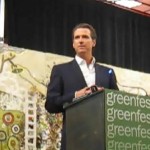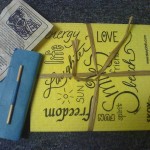
Future plans for waste reduction and the re-use of materials were prominent themes in Mayor Gavin Newsom’s speech at San Francisco’s Green Festival. He also boasted of San Francisco’s success in reducing “greenhouse gas emissions to 5% below 1990 levels in 2008” and spoke of San Francisco’s Fats, oils and grease program, or “Grease Cycle Program,” which picks up grease from restaurants and hotels to make biodiesel.
Upcycling reduces waste and eliminates the need for fresh raw materials and resources by re-using materials. This contributes to a reduction in the energy required to manufacture new products. In an attempt to reduce waste, re-use products, or use biodegradable materials, the following entrepreneurs have embraced upcycling in several creative ways.
An alternative to paper towels, “Skoy cloth, is as absorbent as using 15 sheets of good-quality paper towels at once,” claim the owners, Michelle and Karen. When Michelle lived in Europe, she discovered a product that was similar to Skoy cloth. When she moved back to the U.S., she wasn’t able to find anything as good; that’s when she and Karen came up with the idea. They also wanted to manufacture the cloths in an environmentally responsible manner; 100% biodegradable, the cloths are made from wood-based cellulose pulp and cotton. Skoy means ‘Just for fun’ in Swedish, perfectly suitable for the cute designs and friendly messages on the cloths. I tried one out and I have to admit, it’s definitely absorbent; no wet residue!

From all the extra clothing collected by Goodwill came about Madrone Berries. Jenny Allen uses post-consumer recycled sweaters to make scarves, skirts, elf slippers, and daisy headbands. The patchwork present in her clothing is indicative of the creativity needed to re-use materials so that they don’t end up in landfills. Jenny sees Madrone Berries developing into a grass-roots, membership-based franchise for those interested in producing their own line of regenerated clothing under the Madrone Berries name; where members will have access to patterns and material. Jenny Allen wishes to keep the production of her creations local and sweat-shop free.
No trees were harmed to make these notebooks. A better solution to paper, Nepalese Paper, a company that has been around for thirteen years is fair-trade and Eco-conscious. Nepalese paper is hand made by women in Nepal from the trimmings of the Lokta Bush, a quickly regenerating plant that grows in Nepal. In addition, the store sells scarves from sari fabric trimmings. Purchasing a notebook from here saved me from having to travel out of the festival for a pad of paper; it was great for writing all my notes from the interviews.
In order to meet deadlines for reducing waste and creating green jobs, we must raise the bar in our communities and become committed to achieve these goals. As Michelangelo put it, and which Mayor Newsom quoted, “The biggest risk is not that we aim too high and miss it, it’s that we aim too low and reach it.”



